Odysseus his adventures and life
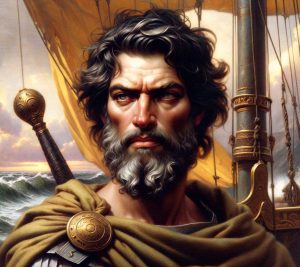
The family tree of Odysseus, one of Agamemnon’s best lieutenants and a hero who distinguished himself like few in the Iliad, remains obscure and elusive. The father (or stepfather) of Laertes is Arkesios, son of Cephalus (known founder of Cephalonia), and grandson of Aeolus. In the tragedy “Iphigenia en Aulidis” by Euripides, the mythical Sisyphus is mentioned as his father, while it is believed that he had a son with Circe, Telegonus.
Ithaca was one of the many islands included in the kingdom of Odysseus, among the Ionian Islands of Ancient Greece. His kingdom seems to have also had a small stronghold in mainland Greece, near the river Acheloos. The exact details and boundaries of the kingdom are not known, as the information provided by Homer is vague.
The name “Odysseus”, derived from the verb “odyssomei” (to be angry, to hate someone) and meaning angry, but also hated by the gods, the one who gave reasons for displeasure, is believed to have been given to him by his grandfather (on the side of his mother), Autolykos. This version is based on the fact that Odysseus hates the Gods and the Gods hate Odysseus.
According to Homer the name means “son of the stone”, but it is more likely etymologically related to the word “guide”. It can also mean “pain” in the sense of “one who causes and feels pain” – it is no coincidence that he feels a constant mental and/or physical pain – that is, he causes pain to someone else and at the same time someone else to him.
It had been prophesied that Odysseus would not return to his island for a long time if he joined the Greek army against Troy, so he pretended to be crazy when Palamedes came to Ithaca to enroll him. He put on torn clothes, and tried to sow the land with salt, while ploughing the fields with a goat and an ox. Palamedes then put the baby Telemachus in front of the plough which made Odysseus stop, revealing his sanity.
After this, Odysseus hated Palamedes, and according to one story he got his revenge through forging a letter from the Tojan king to Palamedes and burying gold under his tent. When the letter and the gold were discovered Palamedes was accused of treason and sentenced to death.
The adventures of the Hero
Odysseus and the Trojan horse
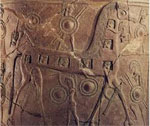
Odysseus was also the one to convince 50 of the Greek heroes to hide inside the Trojan horse. After the Trojan war Odysseus set off for Ithaca, which turned out to be an adventurous journey covering a decade.
The Cicones
The encounter with the Cicones is Odysseus’s first adventure after leaving the ruins of Troy, marking the beginning of his long and arduous journey back to Ithaca. This episode is recounted early in Homer’s “Odyssey” and sets the tone for the trials Odysseus and his crew will face.
Upon departing Troy, Odysseus and his men land on the coast near the city of Ismarus, which is inhabited by the Cicones. Driven by a desire for plunder and perhaps a lingering battle-lust from the Trojan War, Odysseus and his men raid the city, killing the men, capturing the women, and seizing a wealth of goods.
Initially, the raid is successful, and they manage to gather considerable spoils. However, Odysseus advises his men to leave quickly, understanding the danger of overstaying their welcome. His men, flush with victory and the wine they have plundered, ignore his warnings and decide to stay and celebrate their conquest.
This delay proves to be a grave mistake. The Cicones regroup and return at dawn with a much stronger force, calling upon their neighbours for assistance. In the fierce battle that ensues, Odysseus and his men are overwhelmed by the superior numbers of the Cicones. They are eventually driven back to their ships, suffering significant losses. Odysseus loses six men from each ship, a heavy toll that deeply affects him and foreshadows the hardships to come.
The island of Cyclops
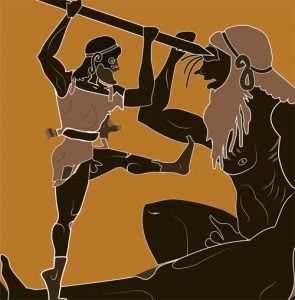
When Polyphemus had fallen asleep he convinced his men to prepare a tree trunk, making it into a sharp weapon, which they put in the fireplace, and then thrust it into the Cyclops only eye. Crying with pain and anger, Polyphemus opened the sealed cave and tried to catch the escaping men.
They had concealed themselves by clinging to the underside of the giant’s sheep so the only thing he felt was the backs of the animals.
His screams woke up the other Cyclops and they shouted what was wrong. Polyphemus then answered “No one has blinded me”, which made the other Cyclops go back to bed, thinking Polyphemus had finally gone out of his mind.
Odyseus in the island of the Lotus Eaters
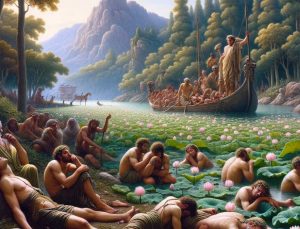
The Lotus-Eaters are a peaceful people who subsist on a diet of the lotus plant.
This plant, however, is no ordinary food; it has the power to induce a forgetfulness and a blissful apathy in those who consume it, causing them to lose all desire to return home or continue their journey.
When Odysseus sends a scouting party to explore the island, some of his men eat the lotus offered by the inhabitants. The effects are immediate: the men are overcome with a desire to stay on the island, forgetting their homes and the mission to return to Ithaca. Recognizing the danger, Odysseus acts quickly to recover his affected crew members.
He orders the rest of his men not to eat the lotus and drags the enchanted men back to the ship by force. Then, he commands his crew to row away from the island as fast as possible to prevent anyone else from succumbing to the lotus’s effects.
The island of the winds
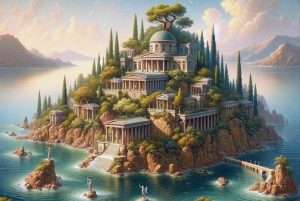
For ten days and nights the ships sailed at full speed. Odysseus stayed awake for fear that the men would open his sack, but when Ithaca was in sight, the exhausted hero slept.
The curious crew then opened the sack, unleashing all the winds, which then took the ships further away than before. They sailed back to Aeolus island, but were chased away since Aeolus had understood Odysseus was hated by the gods, especially Poseidon who hated him for defeating his son the Cyclops.
The ecounter with the Laistrygones
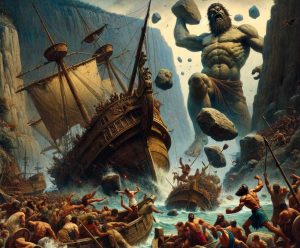
Odysseus sends a scouting party ashore to explore the area and seek out the locals. The party encounters a maiden drawing water at a well, who directs them to the palace of her father, the king of the Laestrygonians, Antiphates.
However, the encounter quickly turns sour when Antiphates reveals the Laestrygonians’ true nature. He captures one of Odysseus’s scouts and calls out to his fellow giants. The Laestrygonians then launch an attack on Odysseus’s ships, which are anchored in the harbor.
Using rocks as projectiles, they sink all the ships except for the one Odysseus is on, as it is anchored away from the main harbor and manages to escape. The giants snatch up the crew members from the other ships and eat them, leading to a devastating loss for Odysseus.
In the island of Circe
After sailing for six days and nights, the ships reached a rocky shore at a country where the people was tall cannibals. They threw rocks at the ships, and they all sunk except Odysseus.
His ship now reached the island Aiae, where Helios’ daughter Circe lived. It was full of wild, but friendly animals, which were really transformed humans.
The beautiful Circe invited some of Odysseus’ men, and turned them into swine with a magic potion. When Odysseus went to find them, Hermes appeared, presenting him with an antidote. The hero drank it, and took Circe by surprise when he did not transform.
He threatened her life, and she turned the swine back to men, and offered Odysseus her love. They all lived together in her palace for a year, and when it was time for Odysseus to leave, Circe told him to find the shadow of the dead seer Tiresias down in Hades.
The journey to Hades
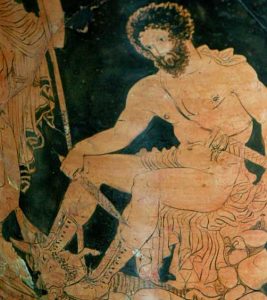
This summoned the dead spirits who wanted to drink the blood which would make them conscious for a while. Odysseus kept them back with his sword, and only let Tiresias drink.
The seer then warned Odysseus not to touch the herds of Helios when he would reach the island Thrinacea. If he did, he would reach home on a foreign ship, only to find misery and the suitors in his palace.
He would kill the suitors and then take an oar on his shoulder and walk until he would find people who did not recognize the oar, and there make a sacrifice to Poseidon. After that, he would reach old age in peace and happiness, and die a death that will come from the sea .
After Tiresias prophecy, the other dead came forth. Odysseus met his mother, Agamemnon, Achilles, Aias plus other heroes and famous women. Finally he saw the head of the Gorgon, and ran back to his ship.
They now sailed back to Circe, who told Odysseus about the sirens.
The Sirens
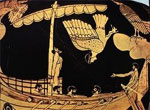
On Circes’ advice Odysseus had his men tie him to the mast while filling their own ears with wax, so that he may hear the sirens song without being able to jump.
Crazed with the Sirens’ song Odysseus tried to sign to the crew to let him go, but they could not hear anything, and had promised the hero that they would not let him go no matter what.
Scylla and Charybdis
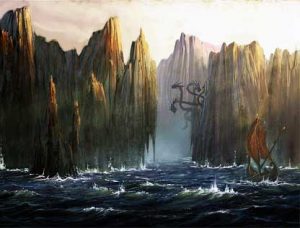
Next stop was Thrinacia (Sicily) which Odysseus, remembering Tiresias prophesy, wanted to sail past. The men refused though, and after making them swear they would not touch Helios’ herd, they went ashore. The bad weather kept them there for a month, and the men starved.
Odysseus went to pray to the gods for help, and the crew now took the opportunity to kill and eat some of the oxen. On his return Odysseus saw smoke from the cooking and terrible scenes appeared: the discarded skins of the animals were in disarray on the ground and their meat roasting on spits.
The weather calmed down, and the ship sailed off, only to be surprised by a terrible storm and being caught by Charybdis. The ship sunk and the crew drowned. Odysseus managed to save himself by clinging to some wood.
At the island of Calypso
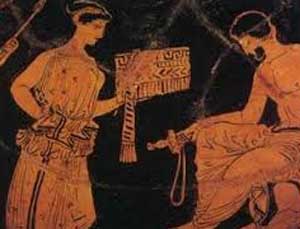
When Poseidon was away, Athena took the opportunity to beg Zeus to help Odysseus. The god then sent Hermes to Calypso with a message to let Odysseus go. Odysseus built a raft and sailed for seventeen days, until he reached Scheria, the island of the Faiacs (supposedly Corfu).
By then, Poseidon had returned, and saw what Odysseus was doing, and unleashed a new storm. Odysseus was tossed around, but was saved by Leucothea who gave the hero her veil and advised him to save himself by swimming.
At the island of Nausicaa
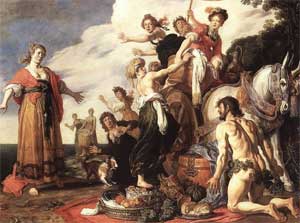
She fed and clothed him, and told him where he was. She then brought him to her parents, king Alcinoos and queen Arete. A party was held in honour of their guest, as well as athletic games and song by the blind bard Demodocus.
When the singer sung of the Trojan horse, Odysseus burst into tears and revealed who he was and what he had endured. Alcinoos then gave him precious gifts and loaded it onto a ship, which took Odysseus back to Ithaca.
The return to Ithaca
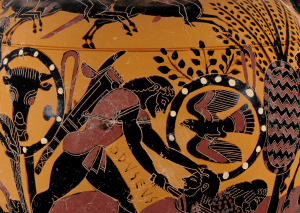
Athena then appeared before him in the shape of a young man, and told him where he was and about the suitors in his palace. They were on the verge of forcing Penelope to make a decision, since they had discovered she tricked them. She had promised to tell them who she would marry when she had finished weaving the death shroud of her father-in-law. However every night she unravelled it, but a treacherous maid revealed this to the suitors.
Odysseus now went to the swineherd Eumaeus, and revealed his identity to him and Telemachus. Together, they went to the palace. Odysseus was disguised as a beggar, and was beaten and ridiculed by the suitors. Only his old dog Argus recognized him, wagged its tail and died.
When Penelope looked after the beggar she asked him if he had heard anything of her husband. Odysseus told him he would be back very soon, but Penelope did not dare to believe him. Washing him, Odysseus’ old nurse recognized a scar on his body, but he told her to be silent.
Penelope now put the suitors through a final test. She showed them Odysseus’ bow and said she would marry whoever could shoot an arrow through the holes of twelve axes in a row. One after one they tried, but they couldn’t even pull the string.
The beggar Odysseus asked to have a go, and under ridicule and laughter he shot a perfect arrow through the twelve axes, then turned the bow against the suitors and started killing them with the help of Telemachus. After this the treacherous maids were punished, and finally, the palace was clear.
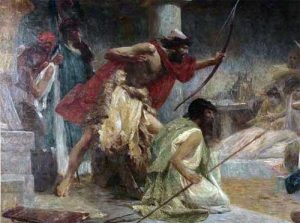
After a meeting with his people, the suitors’ families and friends wanted revenge, but they fled after fighting Odysseus. Athena then intervened, and peace was made.
Odysseus before the Trojan War
Odysseus’ family tree does not begin in Ithaca, where he later reigned, but in Phocis. His great-grandfather, Kefalos, came from this area. Cephalus conquered Cephalonia, but had no sons to succeed him. Addressing the Oracle of Delphi, he received an oracle to mate with the first female animal he encountered. A little later he met a bear, with whom he joined. After their union, the bear transformed into the beautiful Lysippus, who bore him a son, Arkesius.
Son of Archesius and his successor on the throne of Ithaca was Laertes. Laertes took part in the Argonautic Expedition and participated in the hunt for the Calydonian Boar. He married Anticleia and they had many daughters and a son. The boy was named after Anticleia’s father, Autolycus.
Autolykos, having been outraged by the people, decided to name the child Odysseus. However, according to a variant of the myth, Odysseus was not the son of Laertes. Anticleia had slept with Sisyphus, king of Ephyra, a few days before her marriage to Laertes. As a result, Odysseus, according to this version, was the son of Sisyphus, from whom he inherited his cunning and ingenuity.
Autolycus asked Odysseus to visit him on Parnassus when he grew up. Indeed, when Odysseus became a teenager he visited his grandfather. Enthusiastic, Autolycus organized a hunt with Odysseus to entertain his grandson.
The target of the hunt was a boar, which Odysseus managed to hit with his pole. Before the boar was killed, it managed to tear the skin above young Odysseus’ knee. Immediately his grandfather treated his wounds. After the wound was healed, Autolycus sent Odysseus back to Ithaca with many gifts.
That wound left a mark on Odysseus for the rest of his life. In fact, it was the way in which Eurycleia, Odysseus’ beloved nurse, would recognize him before all the others, after the completion of his feast and his return to Ithaca.
A few years later, the young Odysseus, sent by Laertes, travels to Messenia, where he is assigned to ask the Messenians for three hundred sheep and some shepherds they had seized from Ithaca.
At the same time, Ifitos from Oichalia is in Messina, looking for his twelve lost mares. The two young people become friends and exchange gifts: Odysseus gives Iphitus a pole and a sword, while receiving in return a bow, which was a gift from the god Apollo to Iphitus’ father. With this bow Odysseus, many years later, will perform the Oath.
At that time, the Spartan king of Tyndareus, decided that it was time for his daughter, Helen, to get married. A crowd of would-be suitors gathered, among them Odysseus.
Tyndareus, refusing to reject the strong and able men who had assembled, delayed the choice of his daughter’s husband. Then Odysseus, to put an end to the waiting of the suitors, said that Helen should choose her husband, on condition that the others would swear to help her husband if he ever asked for it.
So Helen chose the most powerful of them all, Menelaus. Then, Tyndareus, asked his brother, Ikarius, to give his daughter, Penelope, as a wife to Odysseus.
For the acquaintance between Odysseus and Penelope, there is also a second version. Penelope was a beautiful and intelligent girl. As a result, a large number of young people claimed it. Icarius, in order not to offend anyone through rejection, decided to organize a race, with the winner having his daughter. The winner was none other than Odysseus.
After Odysseus married Penelope, Icarius begged him to stay in Lacedaemon so that he would not be separated from his daughter. Icarius, even though Odysseus refused, was persistent.
Odysseus, outraged by Icarius’ insistence, told Helen to choose one of two options: either leave with her husband for Ithaca or stay with her father. Penelope decided to set sail with her husband for Ithaca, as a result of which she was separated from her father.
A few years later, it means an alarm for the entire Greek area. The Trojan prince Paris steals Helen and Menelaus calls for help. Menelaus’ brother, Agamemnon, sends Palamedes to Ithaca, to call the king of the island to take part in the war, as he was obliged by the oath he had given.
Having received an oracle that after the war it will be many years before he returns home, Odysseus pretends to be mad so as not to participate in the war. To make his supposed madness more convincing, he begins with a plow to throw salt on his fields. In order to expose him, Palamedes places Odysseus’ son, Telemachus, who was still an infant, in front of the plough.
Odysseus descends to remove the infant, revealing himself to have been impersonating the madman. Thus, he too departs for Troy, now knowing that he will return to his homeland after many years.
The death of Odysseus
One day the King had a dream. He was on his bed and saw a beautiful but terrible animal in the form of a god. He wanted to hug it but the one with a human voice told him that they are related and that it is written by him to disappear. Then an arrow came out of the sea and stuck at him. Shortly afterwards he died.
Odysseus asked to have his dream interpreted. The performers asked for Telemachus to come out so that he would not hear.
Then they told him that he was destined to die by his own son. So he sent Telemachus to the villages of Cephalonia to be away.
Time passed. But he saw the same dream again. What Odysseus did not know was that he had another son from Circe, Telegonus, that is, the one who was born far away. (Hesiod mentions 4 children of Odysseus with Circe).
Telegonus becomes was the murderer of his fFather
When Telegonus grew up, Circe told him who his father was and gave him a sea urchin sting that she had put in the spear that Odysseus had given her.
So he told him that his father would recognize him. Telegonos, aiming to find his father, arrives in Ithaca and begins to plunder the island thinking it is Corfu.
There was a ruckus, his companions disturbed the island, and the news reached Odysseus, who went out to confront the raiders.
He threw his javelin at Telegonus but missed and it stuck in a linden tree. Telegonus took aim at Odysseus and hit him with his spear dipped in salachi poison.
Odysseus shortly before he died saw his spear and realized that it was his son. When Telegonus realized what had happened he could not bear his pain. Then everyone remembered the prophecy of Tiresias, which said that Odysseus would die “from hell”. Indeed the sea triangle nailed to the spear verified the oracle. Odysseus died “ex alos”, that is, from the sea.
According to legend. Telegonus takes with him the body of Odysseus, Penelope and Telemachus to Aia.
There the witch Circe makes them immortal and she marries Telemachus and Penelope marries Telegonus.
Summary of the Odyssey
Rhapsody 1
The poet ( Homer ) invites the Muse to tell us the story of Odysseus. Poseidon, who is hostile to the hero, is absent from the Ethiopians and the gods meet on Olympus. At Athena’s initiative, they decide to launch his nosto.
In fulfillment of the divine plan, Athena descends on Ithaca to induce Telemachus to seek his father. In the guise of Mentis, a paternal friend, he enters the palace, where the suitors are reveling in lavishly squandering foreign property. Telemachus welcomes the stranger hospitably, and Athena tries to convince him that his father is alive. She urges him to denounce the behavior of the suitors and to go to the kings of Pylos and Sparta to inquire about Odysseus.
As Athena leaves, she reveals herself and Telemachus is encouraged. The Aedian Phemius sings the return of the Achaeans from Troy, but Penelope comes down in pain and calls him to change the song. Telemachus speaks to her sternly and sends her back to her apartments. He then confidently turns to the suitors, tells them to leave his house and announces that he will bring the matter to the assembly of the Ithacians. An argument ensues. As the first day of the Odyssey’s poetic time ends, Telemachus wakes up and ponders Athena’s suggestions.
Rhapsody 2
On the morning of the second day, Telemachus convenes the assembly, exposes the situation, urges his suitors to leave, and threatens them with divine punishment for their antics. The suitors lay the blame on Penelope, who evades the marriage by artifice, and call upon Telemachus to impose upon her. He retorts that he cannot kick his mother out of the house, but agrees to remarry her if he is given a ship to search for his father and make sure he is dead after all. Two eagles tearing each other apart is interpreted by the seer Alithersis as a sign of the short return of Odysseus and the punishment of the suitors. The suitors curse and threaten the soothsayer, as does Mentor, an old friend of Odysseus, who criticizes the apathy of the Ithacians. The suitor Leocritus declares that even if Odysseus returns, they will kill him, and dissolves the assembly.
Telemachus goes down to the beach and begs Athena to help him. Athena appears in the form of Mentor, reassures him, gives him instructions and offers to help him. Telemachus returns to the palace and, despite the ironies of the suitors, begins the preparations. Eurykleia, his nanny, is worried, but finally swears not to tell his mother. Athena/Mentor finds a ship and sailors, puts the suitors to sleep and announces to Telemachus that everything is ready. The journey begins and continues throughout the night with the favorable wind sent by the goddess. Travelers offer her a libation…
Rhapsody 3
At dawn on the 3rd day of the Odyssey, Telemachus and Athena/Mentor arrive at the beach of Pylos and find the people sacrificing to Poseidon. King Nestor and his sons welcome them hospitably in the gathering. Nestor remembers Odysseus and the suffering of the Achaeans with emotion and describes their discord on leaving Troy. He and Menelaus hurried away to avoid the wrath of the gods, while Odysseus and others stayed behind to offer sacrifices first.
He lists the Achaeans that he learned reached their homelands, but he knows nothing more about Odysseus. As for the situation in Ithaca, he prompts Telemachus to confront the suitors with the help of Athena. Telemachus’ pessimistic response provokes Athena/Mentor’s reaction.
Telemachus changes the subject and asks the king for more details about Agamemnon’s murder. Nestor recounts how Aegisthus stole his wife from him, killed him when he returned, and usurped the throne of Mycenae. His brother Menelaus was unable to help because he too was swept away by the stormy seas in Crete and Egypt.
But his son, Orestes, took the revenge he deserved. When night falls, Nestor does not allow his strangers to spend the night on the ship, but Athena/Mentor departs, revealing her divine identity. Impressed, Nestor promises her a sacrifice and everyone returns to the palace to sleep, including Telemachus, who receives special treatments.
The next day, on the 4th day of the Odyssey, Nestor offers a magnificent sacrifice of a golden-horned ox to Athena and after the meal he prepares chariots and supplies for Telemachus’ journey. Accompanied by Nestor’s son Peisistratus, Telemachus leaves for Sparta. They spend the night in Fira and the next day they continue.
Rhapsody 4
On the morning of the 5th day they reach Sparta and find Menelaus at the double wedding of his children. They enjoy the generous reception and are dazzled by the wealth of the palace. Menelaus speaks painfully of Agamemnon and Odysseus causing Telemachus to cry. Eleni recognizes him first and her husband is excited to have such a guest. Everyone mourns for those they lost.
Helen pours an herb into the wine that drives away the pain. He tells how he once recognized Odysseus when he holed up in Troy to spy. She did not surrender him, on the contrary, she was happy to see him, since she wanted to return to Sparta herself. Menelaus in turn tells how Odysseus saved the Achaeans who were hidden in the Trojan Horse when they were in danger of being discovered.
The next day, on the 6th of the Odyssey, Telemachus asks about his father and describes the situation in Ithaca. Menelaus wishes for the death of the suitors and tells of his exile in Egypt. There he tamed the terrible old man of the sea Proteas and he advised him to make a sacrifice to Zeus. Among other things, he told him that Odysseus is alive and stranded on the island of Calypso. Ending his narrative, Menelaus invites Telemachus to stay longer in Sparta, but he politely refuses.
In Ithaca, the suitors are surprised to learn of Telemachus’ journey and decide to kill him by treachery. Penelope learns the news and fears that she will now lose her son as well. She prays to Athena and she brings her sister Iphthimi to her sleep, who reassures her with the assurance that Telemachus is under the protection of the goddess. In the meantime, the suitors rig a boat and set up their ambush in the straits of Sami.
Rhapsody 5
On the morning of the 7th day the Gods made another purchase on Olympus. Zeus sends Hermes to Ogygia with the command to Calypso to leave Odysseus. Zeus announces to the gods that Odysseus will return to Ithaca after 20 days wandering the sea without the help of gods or humans because that is how his fate has been written.
Calypso accuses them of being jealous of her for falling in love with a mortal and gives them many examples to prove their jealousy, but eventually relents in fear of Zeus’s wrath after Hermes reminds her of how great Zeus’s wrath is and that everyone they fear her.
For the first time we see Odysseus, because until now we have mentioned him we had not seen him speak, he is crying on the beach looking at the sea, when the nymph announces the good news to him, but hiding from him that it is not her decision but Zeus’s Odysseus puts it to swear and she tells him that she will help him (she swears to make him believe her) but she warns him that his suffering is not over because she thinks she will terrify him and change his mind to stay with her. After the meal they spend their last night together.
Over the next four days Odysseus builds a raft with Calypso’s tools and on the fifth day (the 12th of the Odyssey) he sets out. Calypso gives him supplies, instructions and a strong wind for the journey. After seventeen days, at dawn on the eighteenth (29th), the coasts of Sheria, the land of the Phaeacians, appear on the horizon. However, as Poseidon returns from the Ethiopians, he sees Odysseus and, in anger, raises a terrible storm at sea. The raft breaks up and Odysseus fights the waves on a beam. The goddess Lefkothei takes pity on him and gives him a life-saving scarf. He girds it, throws off his clothes and jumps into the sea. Poseidon departs in gleeful satisfaction, whereupon Athena intervenes and somewhat calms the storm.
For two more days Odysseus sails, until on the third (31st) he manages, with the help of Athena, to approach the coast of Sheria and reach the mouth of a river. He prays to the river to save him and the river accepts him. Ulysses, naked and impoverished, goes ashore and takes refuge in a forest, where he sleeps hidden in the bushes.
Rhapsody 6
While Odysseus sleeps, Athena goes to the city of the Phaeacians and appears in the dream of Nausicaa, the daughter of King Alcinous, taking the form of her friend. He reminds her that she is of marriageable age and urges her to go down to the river to wash her clothes. The next morning (32nd day) Nausicaa asks her father for a car and she and her friends go down to the river. After washing the clothes, they bathe, have lunch and play with the topi shouting and singing.
Odysseus wakes up bewildered and wonders where he is. He decides to come out of the bushes hiding his nakedness. The girls scatter in terror, except for Nausicaa, who is encouraged by Athena. Keeping his distance, Odysseus praises his daughter’s beauty and wishes her a happy marriage. He describes his situation to her and begs her to show him the way to the city and give him a rag to cover himself with. Nausicaa recognizes the kindness hidden in his impoverished appearance and assures him that he is welcome in this country. She calls out to her friends to get over it and treat him.
Out of respect for the young maidens, Odysseus bathes aside and Athena surrounds him with divine beauty. Dazzled by Nausicaa, she wishes that the man who will marry her would also be like that. She calls Odysseus to the palace, but so as not to be ill-characterized, she instructs him to follow her to Athena’s grove, outside the city. After staying there for a while until she herself returned home, ask to be shown the palace of Alcinous, and there beg at the queen’s knees. Nausicaa starts, her friends and Odysseus follow. At dusk they reach the grove and Odysseus prays to Athena that the Phaeacians will welcome him.
Rhapsody 7
Nausicaa arrives at the palace and Odysseus sets out from the grove for the city. Athena appears on his way in the form of a young girl and shows him the way by covering him with mist so he doesn’t get into trouble with the locals. She tells him about the Phaeacians and Queen Aretis and advises him to approach her first.
Odysseus arrives at the palace and cannot believe his eyes: gold, silver and copper everywhere, textiles, a multitude of slaves, and a heavenly orchard. The lords of the Phaeacians eat and drink inside. He approaches Areti and then the mist that covered him disappears. Bewildered, the patrons see the stranger falling supplicatingly at the queen’s feet, begging to be sent to his homeland. After the first embarrassment, Alcinous offers his hospitality and invites the rulers of the Phaeacians to organize an official reception for the stranger.
Rhapsody 8
Nausicaa arrives at the palace and Odysseus sets out from the grove for the city. Athena appears on his way in the form of a young girl and shows him the way by covering him with mist so he doesn’t get into trouble with the locals. She tells him about the Phaeacians and Queen Aretis and advises him to approach her first.
Odysseus arrives at the palace and cannot believe his eyes: gold, silver and copper everywhere, textiles, a multitude of slaves, and a heavenly orchard. The lords of the Phaeacians eat and drink inside. He approaches Areti and then the mist that covered him disappears. Bewildered, the patrons see the stranger falling supplicatingly at the queen’s feet, begging to be sent to his homeland. After the first embarrassment, Alcinous offers his hospitality and invites the rulers of the Phaeacians to organize a formal reception for the stranger the next day, in case he is a god. Odysseus assures that he is not a god and repeats his prayer.
The rest of the Phaeacians leave. Areti recognizes the clothes the stranger is wearing and asks him who he is and how he got there. Odysseus briefly recounts his shipwreck, his seven-year stay on Calypso, his turbulent journey to Sheria and his meeting with Nausicaa, but he does not reveal his identity. Alcinous criticizes his daughter for not accompanying the stranger to the palace, and wishes to make him his son-in-law. But he promises that the Phaeacians will lead him to his homeland, if he prefers it. The day ends with the exhausted Odysseus falling asleep enjoying the pampering of the attendants.
Rhapsody 9
The next morning (the 33rd day of the Odyssey) the lords of the Phaeacians gather in assembly and Alcinous introduces his stranger, asks for a boat to be prepared, and invites them all to the reception table in the palace. The palace fills with people and the aedic Demodocus arrives. After the meal he sings of a quarrel between Odysseus and Achilles at Troy. Odysseus, who listens without revealing his identity, is moved, but hides his tears. To amuse his grief Alcinous invites the Phaeacian lads to sports.
Everyone goes down to the market again and the young people compete in sports. At the end, Odysseus is also called to fight, as he still looks young and strong. Odysseus initially refuses, but when Euryalus challenges him, he gets angry, grabs the heaviest disk and throws it farther than everyone else. He turns to the speechless Phaeacians and reveals to them that he was first of all in the Trojan War. Alcinous responds by extolling his people’s virtues of seafaring, feasting, and merrymaking.
The tension relaxes and the dance begins. In the middle, Demodocus sings the mocking song of the crippled Hephaestus, who caught the beautiful Aphrodite and Ares in his conjugal bed and denounced them to the gods, but they laughed at him. Two sons of Alcinous perform impressive dance figures, which provoke the laudatory comments of Odysseus. Alcinous now senses that the stranger is not a random person and proposes to the rulers of the Phaeacians to give him valuable gifts. Euryalos gives his sword and his apology to the stranger.
